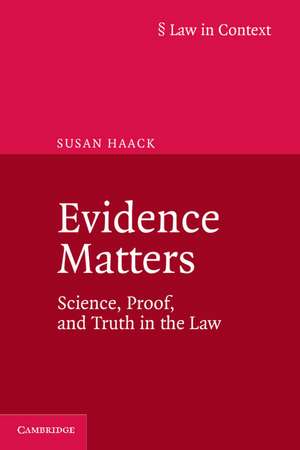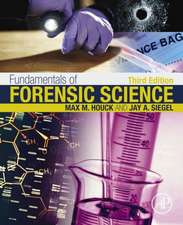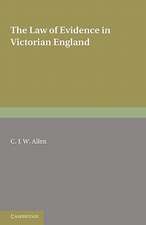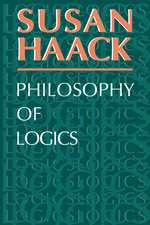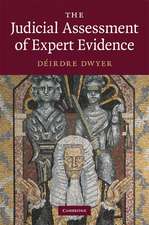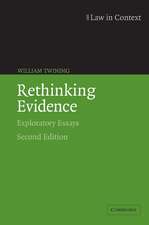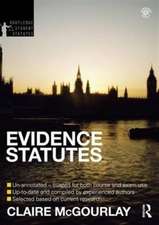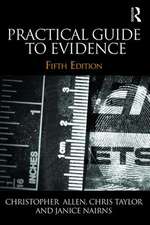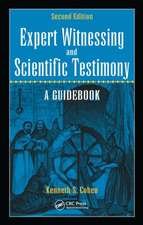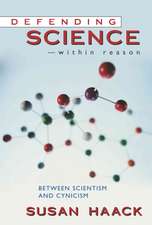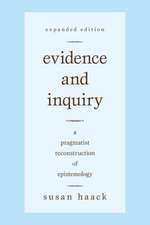Evidence Matters: Science, Proof, and Truth in the Law: Law in Context
Autor Susan Haacken Limba Engleză Paperback – 27 iul 2014
| Toate formatele și edițiile | Preț | Express |
|---|---|---|
| Paperback (1) | 267.63 lei 3-5 săpt. | +27.93 lei 6-12 zile |
| Cambridge University Press – 27 iul 2014 | 267.63 lei 3-5 săpt. | +27.93 lei 6-12 zile |
| Hardback (1) | 584.70 lei 6-8 săpt. | |
| Cambridge University Press – 27 iul 2014 | 584.70 lei 6-8 săpt. |
Din seria Law in Context
- 9%
 Preț: 697.36 lei
Preț: 697.36 lei -
 Preț: 396.47 lei
Preț: 396.47 lei -
 Preț: 231.05 lei
Preț: 231.05 lei -
 Preț: 201.95 lei
Preț: 201.95 lei - 9%
 Preț: 699.67 lei
Preț: 699.67 lei -
 Preț: 230.06 lei
Preț: 230.06 lei -
 Preț: 234.79 lei
Preț: 234.79 lei - 14%
 Preț: 869.10 lei
Preț: 869.10 lei -
 Preț: 231.76 lei
Preț: 231.76 lei -
 Preț: 315.01 lei
Preț: 315.01 lei -
 Preț: 274.34 lei
Preț: 274.34 lei -
 Preț: 321.38 lei
Preț: 321.38 lei -
 Preț: 314.81 lei
Preț: 314.81 lei - 9%
 Preț: 663.35 lei
Preț: 663.35 lei -
 Preț: 278.81 lei
Preț: 278.81 lei -
 Preț: 233.26 lei
Preț: 233.26 lei -
 Preț: 395.99 lei
Preț: 395.99 lei -
 Preț: 416.21 lei
Preț: 416.21 lei -
 Preț: 316.44 lei
Preț: 316.44 lei -
 Preț: 388.95 lei
Preț: 388.95 lei -
 Preț: 380.93 lei
Preț: 380.93 lei - 14%
 Preț: 826.72 lei
Preț: 826.72 lei -
 Preț: 353.89 lei
Preț: 353.89 lei -
 Preț: 267.88 lei
Preț: 267.88 lei - 14%
 Preț: 701.93 lei
Preț: 701.93 lei - 11%
 Preț: 495.94 lei
Preț: 495.94 lei -
 Preț: 334.96 lei
Preț: 334.96 lei - 11%
 Preț: 497.03 lei
Preț: 497.03 lei -
 Preț: 447.63 lei
Preț: 447.63 lei - 11%
 Preț: 567.59 lei
Preț: 567.59 lei - 11%
 Preț: 422.74 lei
Preț: 422.74 lei -
 Preț: 453.38 lei
Preț: 453.38 lei - 11%
 Preț: 607.85 lei
Preț: 607.85 lei -
 Preț: 401.19 lei
Preț: 401.19 lei -
 Preț: 361.16 lei
Preț: 361.16 lei - 11%
 Preț: 581.08 lei
Preț: 581.08 lei -
 Preț: 286.30 lei
Preț: 286.30 lei - 11%
 Preț: 687.20 lei
Preț: 687.20 lei -
 Preț: 394.81 lei
Preț: 394.81 lei
Preț: 267.63 lei
Nou
51.21€ • 53.75$ • 42.51£
Carte disponibilă
Livrare economică 20 martie-03 aprilie
Livrare express 05-11 martie pentru 37.92 lei
Specificații
ISBN-10: 1107698340
Pagini: 446
Ilustrații: black & white illustrations
Dimensiuni: 152 x 226 x 25 mm
Greutate: 0.59 kg
Ediția:New.
Editura: Cambridge University Press
Colecția Cambridge University Press
Seria Law in Context
Locul publicării:New York, United States
Cuprins
1. Epistemology and the law of evidence: problems and projects; 2. Epistemology legalized: or, truth, justice, and the American way; 3. Legal probabilism: an epistemological dissent; 4. Irreconcilable differences? The troubled marriage of science and law; 5. Trial and error: two confusions in Daubert; 6. Federal philosophy of science: a deconstruction - and a reconstruction; 7. Peer review and publication: lessons for lawyers; 8. What's wrong with litigation-driven science?; 9. Proving causation: the weight of combined evidence; 10. Correlation and causation: the 'Bradford Hill Criteria' in epidemiological, legal, and epistemological perspective; 11. Risky business: statistical proof of specific causation; 12. Nothing fancy: some simple truths about truth in the law.
Recenzii
'Evidence Matters is an exciting collection of insightful essays from a respected authority that will receive attention from both philosophers and legal scholars.' Carl F. Cranor, Distinguished Professor, University of California, Riverside
'Evidence Matters combines and updates essays, chapters, and books previously written, published and presented at numerous workshops, symposia, colloquia, and lectures, including mathematical faculties, medical, and law schools. … A copy of this book would be an excellent addition to the reading collection of every justice, judge, and lawyer. Its relevance and insights have application wherever investigation desires to justify belief.' Rafael Silva, The Champion
Descriere
Is truth in the law just plain truth - or something sui generis? Is a trial a search for truth? Do adversarial procedures and exclusionary rules of evidence enable, or impede, the accurate determination of factual issues? Can degrees of proof be identified with mathematical probabilities? What role can statistical evidence properly play? How can courts best handle the scientific testimony on which cases sometimes turn? How are they to distinguish reliable scientific testimony from unreliable hokum? These interdisciplinary essays explore such questions about science, proof, and truth in the law. With her characteristic clarity and verve, Haack brings her original and distinctive work in theory of knowledge and philosophy of science to bear on real-life legal issues. She includes detailed analyses of a wide variety of cases and lucid summaries of relevant scientific work, of the many roles of the scientific peer-review system, and of relevant legal developments.
